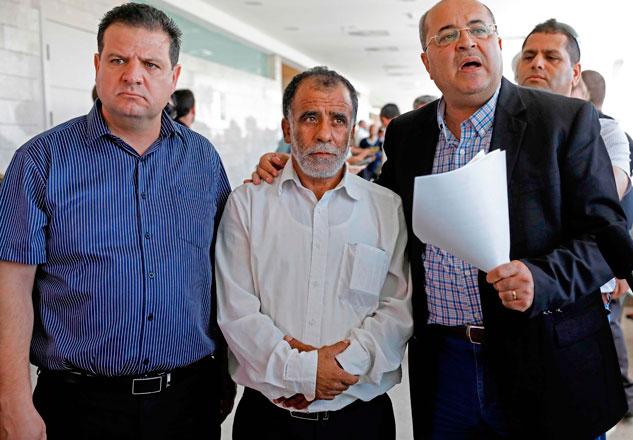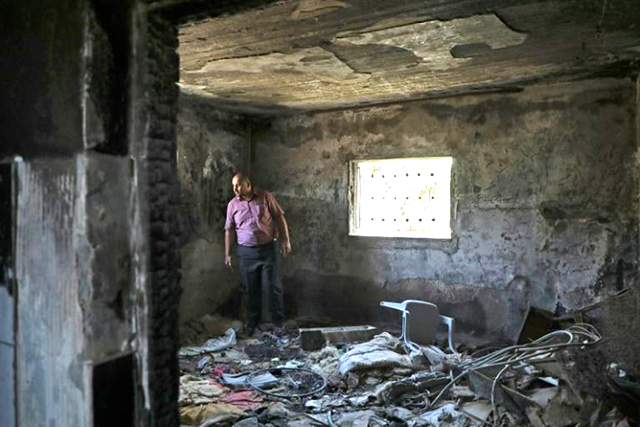You are here
Israel court strikes down confessions of baby murder suspects
By AFP - Jun 19,2018 - Last updated at Jun 19,2018

Hussein Dawabsheh (centre), grandfather of a Palestinian toddler who was burnt to death with his parents at their family home, stands with Israeli parliament members Ayman Odeh (left) and Ahmad Tibi, during the trial of the two Jewish men suspected of carrying out the attack, on Tuesday at a court in the town of Lod (AFP photo)
LOD, Israel — An Israeli court has struck down some, but not all, of the confessions of two Jewish suspects in the arson attack that killed a Palestinian toddler and his parents, ruling that interrogators obtained them by duress.
The decision of the court in Lod, central Israel, could cast doubt on the strength of the prosecution’s case against the accused — Amiram Ben-Uliel from the northern West Bank settlement of Shilo and a minor who cannot be named.
Eighteen-month-old Ali Dawabsheh was burnt to death when the family home, in the Israeli-occupied West Bank, was firebombed in July 2015.
His parents later died from their injuries. His brother Ahmed, now six, was the sole survivor from the immediate family but was left with severe burns.
Israeli occupation forces came under heavy pressure to catch and try those responsible.
Ben-Uliel was charged in January 2016 with three counts of murder and one of attempted murder, arson and conspiracy to commit a hate crime.
His alleged accomplice, aged 17 at the time of the attack, was charged with being an accessory to committing a racially motivated murder.
“The charge sheet accuses both of the accused of membership of a terror organisation seeking to inflame the security situation for nationalistic and inter-religious reasons,” court documents seen by AFP said.
The Shin Bet internal security service held suspects under administrative detention, denied some of them the right to see a lawyer part of the time and used physical force during investigations, the documents claimed.
Supporters of the suspects — religious extremists known as “hilltop youth” who oppose the “secular” Israeli state — denounced those methods.
Shin Bet denies using any illegal methods, and has stressed the entire investigation was conducted under the supervision of the attorney general.
The documents provided by the Lod court said both suspects had been grilled by Shin Bet using “’special means’ including physical means”.
“Shortly after the use of these means began... [Ben-Uliel] admitted carrying out the attack at Duma,” they said.
They did not elaborate on the techniques used but Israeli daily Haaretz said they would typically have included “painful physical means such as binding hands and feet and leaning the lower back on a chair, or prolonged uncomfortable kneeling”.
The court heard that in subsequent, videotaped, interrogations where no physical pressure was used Ben-Uliel repeated his confession.
It ruled that it would not accept the admission under duress but that the subsequent repetition of the confession was admissible.
The minor, the transcript said also underwent “special means” interrogations “during which he eventually confessed to participating in the planning of the attack in Duma”.
That too was rejected, but an earlier admission made to undercover policemen posing as fellow-prisoners in his jail cell was deemed to be acceptable.
“The trial continues,” prosecuting lawyer Rachel Avissar-Abeless told reporters outside the packed courtroom.
“The court accepted our argument that the witness confessions are valid.”
Not torture?
The state prosecutor’s office said in a statement that the use of “special means” interrogations were permissible because of the danger that the accused, and others they were in contact with, were likely to carry out more attacks unless stopped.
“In addition”, it said, “the court did not rule that the interrogation methods used constituted torture.”
“The court rejected the request of the accused for a blanket disqualification of all the confessions.”
The dead baby’s grandfather, Hussein Dawabsha said the court decision to validate crucial confessions was “the right way to go”.
The prosecutor’s office has said from the outset that the disputed confessions were not essential for a conviction, but Haaretz was unconvinced.
“Rejecting the testimony means that most of the evidence would be circumstantial, greatly weakening the case,” it wrote.
Related Articles
LOD — An Israeli court on Monday found a Jewish settler guilty of three murders in an arson attack that killed a Palestinian toddler and his
YISHUV HADAAT, West Bank — The caves around this windy settler outpost, whose name is Hebrew for “Of Sound Mind”, have served as places of m
OCCUPIED JERUSALEM — An Israeli court on Thursday ordered a suspect in a firebombing that killed a Palestinian family to be released from pr



















